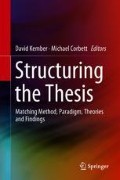Abstract
What is an appropriate structure for reporting a study of Indigenous Knowledge and place based education, following the critical paradigm, and adopting participatory action research?
Access this chapter
Tax calculation will be finalised at checkout
Purchases are for personal use only
References
Bradbury, H., Mirvis, P., Neilsen, E., & Pasmore, W. (2008). Action research at work: Creating the future following the path from Lewin. In The SAGE handbook of action research: Participative inquiry and practice, 2 (pp. 77–92).
Duenkel, N., & Pratt, J. (2013). Ecological education and action research: A transformative blend for formal and nonformal educators. Action Research, 11(2), 125–141.
Goodnough, K. (2008). Dealing with messiness and uncertainty in practitioner research: The nature of participatory action research. Canadian Journal of Education, 31(2), 431–458.
Johns, T. (2008). Learning to love our black selves: Healing from internalized oppressions. In P. Reason & H. Bradbury (Eds.), The Sage handbook of action research, participative inquiry and practice (473–486). London: SAGE.
Kemmis, S., & McTaggart, R. (2005). Participatory action research: Communicative action and the public sphere. In N. Denzin & Y. Lincoln (Eds.), The Sage handbook of qualitative research (3rd ed., pp. 559–603). Thousand Oaks, CA: Sage.
Kindon, S., Pain, R., & Kesby, M. (2007). Participatory action research approaches and methods: Connecting people, participation and place (iBooks). Retrieved from https://www.apple.com/au/ibooks/.
MacIntosh, R., Bonnet, M., Marshall, J., & Reason, P. (2007). Quality in research as “taking an attitude of inquiry”. Management Research News, 30(5), 368–380.
McArdle, K. L., & Reason, P. (2008). Action research and organization development. In T. G. Cummings (Ed.), Handbook of organization development (pp. 123–136).
Reason, P. (1998). Political, epistemological, ecological and spiritual dimensions of participation. Studies in Cultures, Organizations and Societies, 4(2), 147–167.
Riding, P., Fowell, S., & Levy, P. (1995). An action research approach to curriculum development. Information research, 1(1), 1.
Scotland, J. (2012). Exploring the philosophical underpinnings of research: Relating ontology and epistemology to the methodology and methods of the scientific, interpretive, and critical research paradigms. English Language Teaching, 5(9), 9–16.
Semali, L. M. (1999). Community as classroom: (Re) valuing indigenous literacy. In What is indigenous knowledge (pp. 95–118).
Smith, G., & Sobel, D. (2014). Place-and community-based education in schools. Routledge.
Stringer, E. T. (2014). Action research (4th ed.). Los Angeles: SAGE.
Titchen, A. (2015). Action research: Genesis, evolution and orientations. International Practice Development Journal, 5(1), 1–16 (16p).
Tuck, E., & McKenzie, M. (2015). Place in research. [electronic resource]: Theory, methodology, and methods. New York; London: Routledge, Taylor & Francis Group.
Author information
Authors and Affiliations
Corresponding author
Editor information
Editors and Affiliations
Rights and permissions
Copyright information
© 2018 Springer Nature Singapore Pte Ltd.
About this chapter
Cite this chapter
Kezabu, K., McMahon, J., Kember, D., Hill, A. (2018). Intersections of Indigenous Knowledge and Place Based Education: Possibilities for New Visions of Sustainability Education in Uganda. In: Kember, D., Corbett, M. (eds) Structuring the Thesis. Springer, Singapore. https://doi.org/10.1007/978-981-13-0511-5_14
Download citation
DOI: https://doi.org/10.1007/978-981-13-0511-5_14
Published:
Publisher Name: Springer, Singapore
Print ISBN: 978-981-13-0510-8
Online ISBN: 978-981-13-0511-5
eBook Packages: EducationEducation (R0)

